Remote Meeting Information
As we build our meetings, we can include all of our remote meeting information, such as phone numbers to call and hyperlinks to join the teleconference. These details will be displayed to our meeting's attendees when they view the Meeting Details page.

OnBoard's integration with Zoom opens up many different device/software combination possibilities, allowing you to choose the one that works best for you. Below, we'll outline each of these unique examples and cite some of the benefits and limitations of each one so you can decide which method you may prefer.
The OnBoard + Zoom Integration is just one of many possible choices. Please note that just because the Meeting Administrator has chosen to place the Zoom information into OnBoard for easy access, it does NOT mean that you are required to join the Zoom meeting through OnBoard. You're always welcome to take the Zoom Meeting information and open it outside of OnBoard - or even on a separate device entirely. From the web browser, here's an example on how each of these situations might be accomplished:
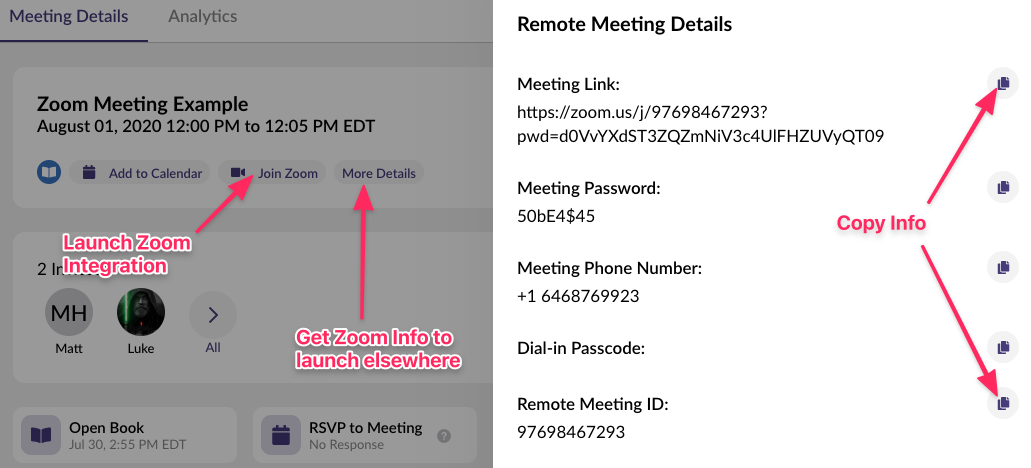
Glossary
Before we dive into these examples, lets first get a few key terms defined.
OnBoard + Zoom Integration - This is referring to the picture-in-picture Zoom overlay that appears in the corner of the OnBoard screen. This view can be achieved by clicking "JOIN ZOOM" from within the OnBoard website or app. When using this option, the Zoom window will ALWAYS overlay OnBoard. You're able to move the small window around the page, but you will not be able to move it off of the page.
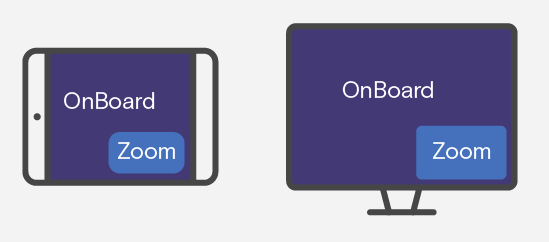
Split-screen - When using a computer, or even some of the newer tablets - you're able to segment portions of your screen for separate browser windows or apps. This allows you to see these unique applications simultaneously, but with a little reduced visibility due to the maximum overall screen real estate. This is accomplished by opening the OnBoard app, then the Zoom app separately, and displaying them both on the same screen, at the same time. (For more info about how to use split-screen on an iPad, view this article).
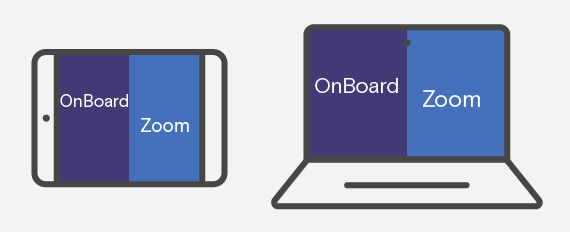
Web App - This refers to the web-browser version of OnBoard, accessible through a desktop or laptop computer at https://app.onboardmeetings.com/
Mobile App - This refers to the application that can be downloaded from the Apple or Google mobile app stores for your tablets or phones.
Single Screen Examples
We'll start with our single-screen combination examples. The examples listed in this category will be beneficial for users who only have a single screen available to them, such as a laptop or a tablet only.
Example 1: [Mobile App] Single Screen using the OnBoard Integration
Using either a phone or tablet, launching the OnBoard application, then joining Zoom directly from your meeting. In this example, OnBoard's full functionality will be available, but Zoom will be limited.
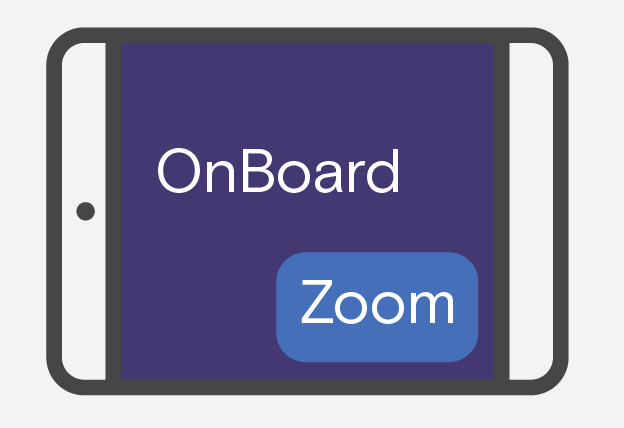
| Benefits | Zoom Limitations |
|
Very portable Picture-in-Picture View |
Gallery View only available in Full Screen No Zoom Host functionality No Zoom Chat No Zoom Screen Sharing No Breakout Rooms No Meeting Recording No Waiting Rooms |
Example 2: [Mobile App] Single Screen using Separate Full-Screen Apps
Using either a phone or tablet, launching the OnBoard and Zoom apps separately, joining the Zoom meeting independently from OnBoard. In this example, you'll have the full functionality of both applications, but you will not be able to see them on screen at the same time.
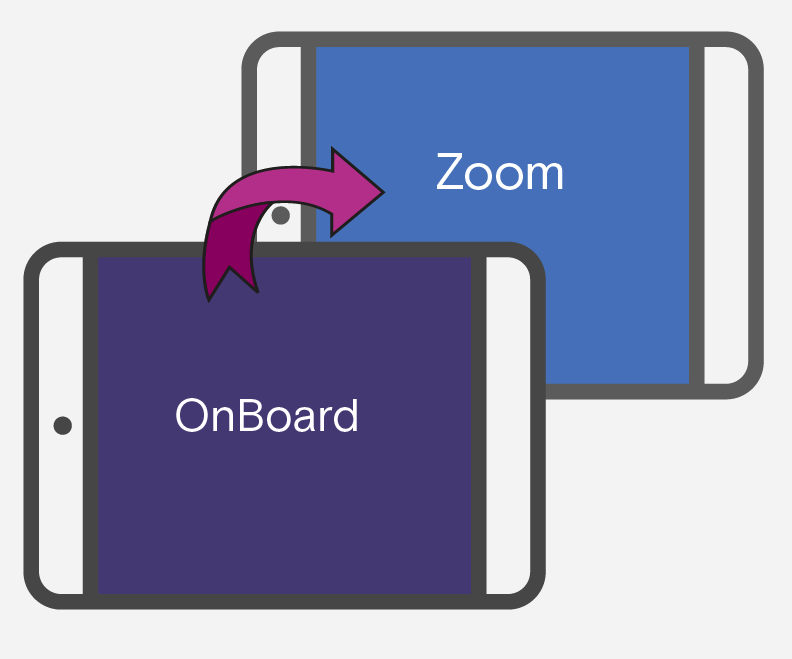
| Benefits | Zoom Limitations |
|
Very portable Zoom Gallery or Speaker views Limited Zoom Host functions Zoom Chat available Zoom Screen Sharing available |
Cannot see both apps at the same time No Breakout Rooms No Meeting Recording No Waiting Rooms |
Example 3: [Mobile App] Single Screen using Separate Split-Screen Apps
Similar to the previous example, this one uses either a phone or tablet, launching the OnBoard and Zoom apps separately, joining the Zoom meeting independently from OnBoard. Then, using the device's Multitasking feature to display partial views of each screen at the same time. (More Info about Multitasking on Apple Devices.)
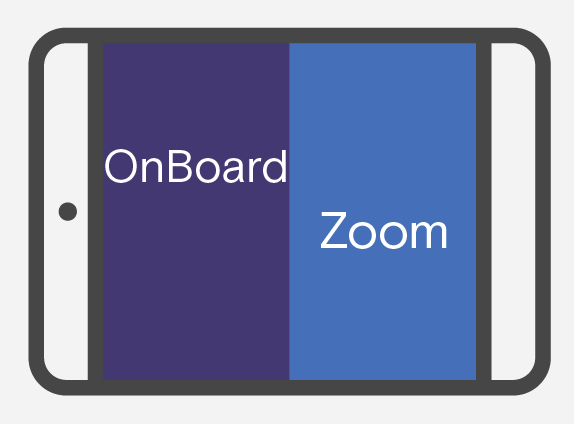
| Benefits | Zoom Limitations |
|
Very portable Can see both apps at the same time Zoom Gallery or Speaker views Limited Zoom Host functions Zoom Chat available Zoom Screen Sharing available |
Smaller screen real estate per app No Breakout Rooms No Meeting Recording No Waiting Rooms |
Example 4: [Web Browser] Single Screen using OnBoard Integration
This example is very similar to Example #1, however, we get access to a few more Zoom functions when joining from a web browser instead of the mobile app. Here we will be accessing OnBoard from a laptop or desktop computer, and launching the Zoom meeting through the integration (by clicking JOIN ZOOM from inside OnBoard).
| Benefits | Zoom Limitations |
|
Very portable (from laptop) Picture-in-Picture View Zoom Chat Available (in full screen) Zoom Screen Sharing available |
Gallery View only in full screen No Zoom Host functions No Breakout Rooms No Meeting Recording No Waiting Rooms |
Example 5: [Web Browser] Single Screen using Separate Full-Screen Apps
This example is similar to Example #2, but again, we get access to more features when using the web version of the apps. Using either a laptop or desktop computer to log into OnBoard, then joining the Zoom meeting independently from OnBoard. In this example, you'll have the full functionality of both applications, but you will not be able to see them on screen at the same time. You can swap between browser tabs/windows, or ALT+TAB to quickly swap between applications.
| Benefits | Limitations |
|
Very portable (from laptop) Zoom Gallery or Speaker view Full Zoom Host functions Zoom Chat available Zoom Screen Sharing available Breakout Rooms available Meeting Recording available Waiting Rooms available |
Cannot see both apps at the same time |
Example 6: [Web Browser] Single Screen using Separate Split-Screen Apps
This example is similar to Example #3, with access to a few more features when using the web versions of each application. Here, we will be using either a laptop or desktop computer and launching the OnBoard and Zoom apps separately, joining the Zoom meeting independently from OnBoard. Then, resizing the windows to display partial views of each application at the same time.
| Benefits | Limitations |
|
Very portable (from laptop) Can see both apps at the same time Full Zoom Host functions Zoom Chat available Zoom Screen Sharing available Breakout Rooms available Meeting Recording available Waiting Room available |
Smaller screen real estate per app |
Two Screen Examples
Next, we'll take a look at some examples that use multiple screens or multiple devices. There aren't many examples here to choose from, but this does open up the opportunity to mix-and-match device types that work best for you. Desktop computer with two stationary monitors. Laptop computer with an extra monitor. Laptop computer and your tablet - these are just a few combinations to choose from! The two major downsides to these examples will be that they're (typically) far less portable than a single-screen experience, and sometimes not very cost effective.
Example 7: [Web Browser] Two Screens using Separate Full Screen Apps
This example uses one laptop or desktop computer plugged into a second monitor, allowing for a dedicated, full-screen, simultaneous viewing experience. Join OnBoard on one of the screens, and Zoom (separately) on the secondary screen.
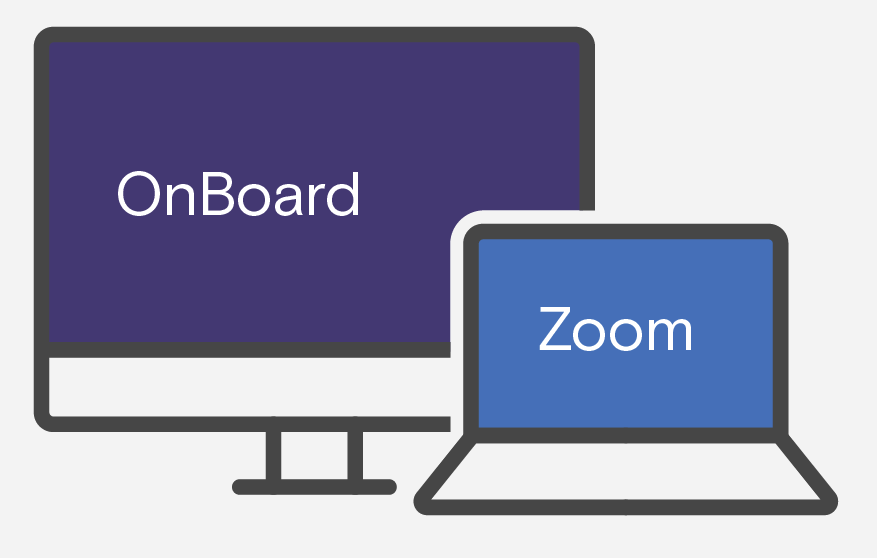
| Benefits | Limitations |
|
Zoom Gallery or Speaker view Both apps fully visible independently Full Zoom Host functions Zoom Chat available Zoom Screen Sharing available Breakout Rooms available Meeting Recording available Waiting Room available |
Cost Portability |
Example 8: [Mobile and Web Combo] Two Devices using Separate Full Screen Apps
This last example will be a little tricky to demonstrate, since there are many different combinations. Please keep in mind that the standalone Web Version of Zoom and the standalone Mobile Version of Zoom have different capabilities, that can be referenced in some of the previous examples. Primary use case here will be something like a laptop and a tablet screen combination, but you could theoretically use your desktop computer and your phone, or two different laptops, if you wanted.
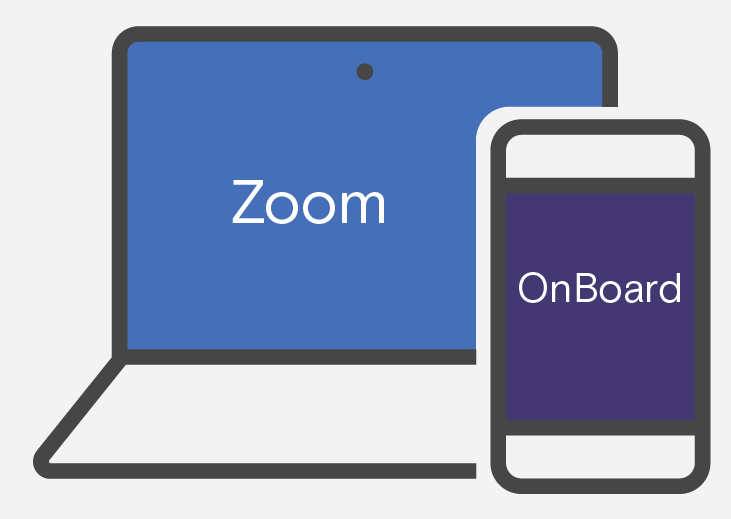
| Benefits | Limitations |
|
Flexible combination possibilities [If using a mobile app - See Example #2's benefits] [If using a web app - See Example #5's benefits] |
Cost Portability [If using a Mobile device for Zoom - See Example #2's limitations] |
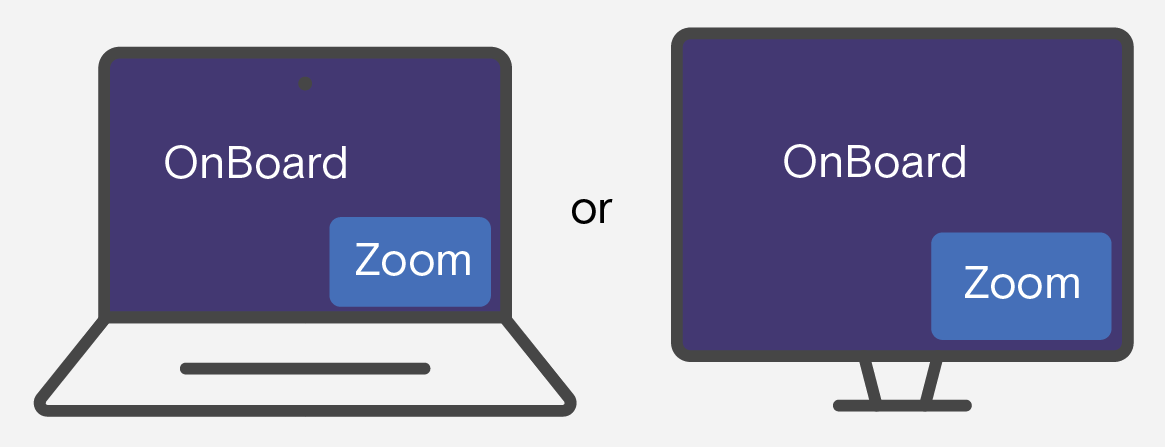
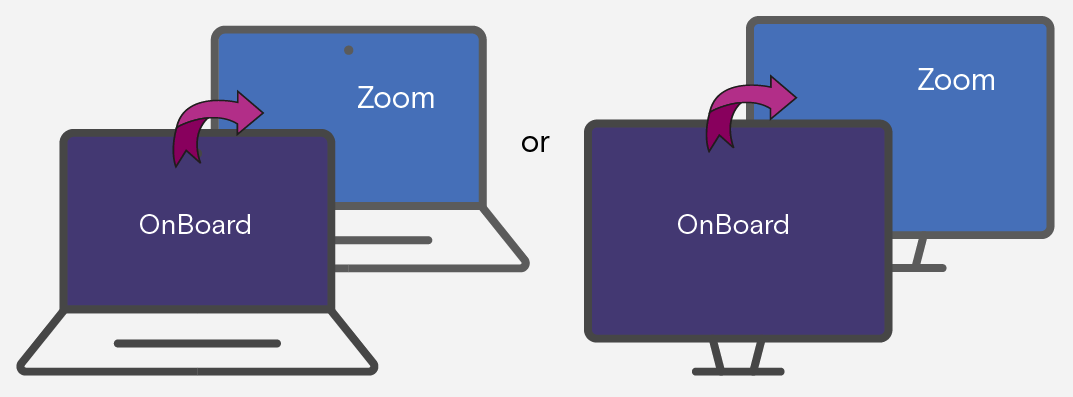
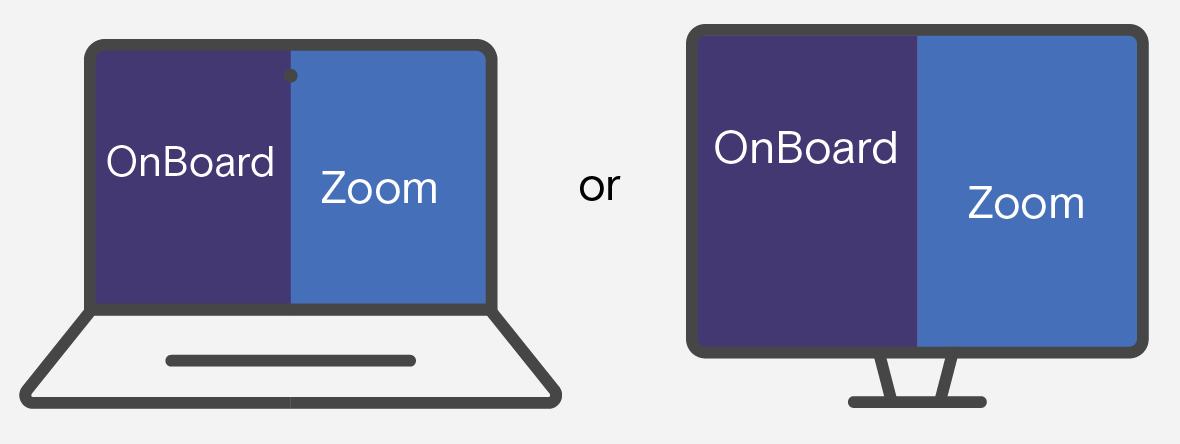
Comments
0 comments
Please sign in to leave a comment.